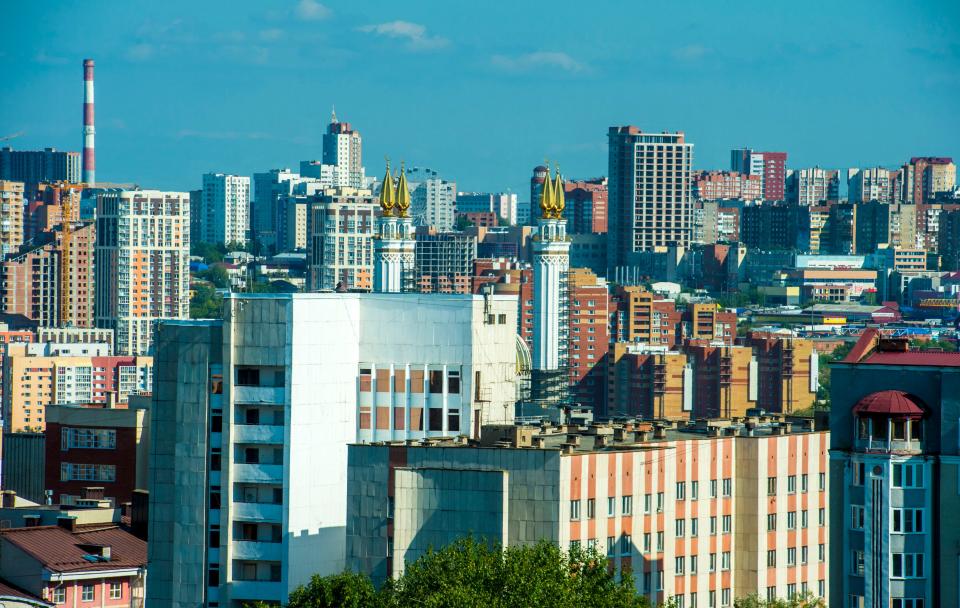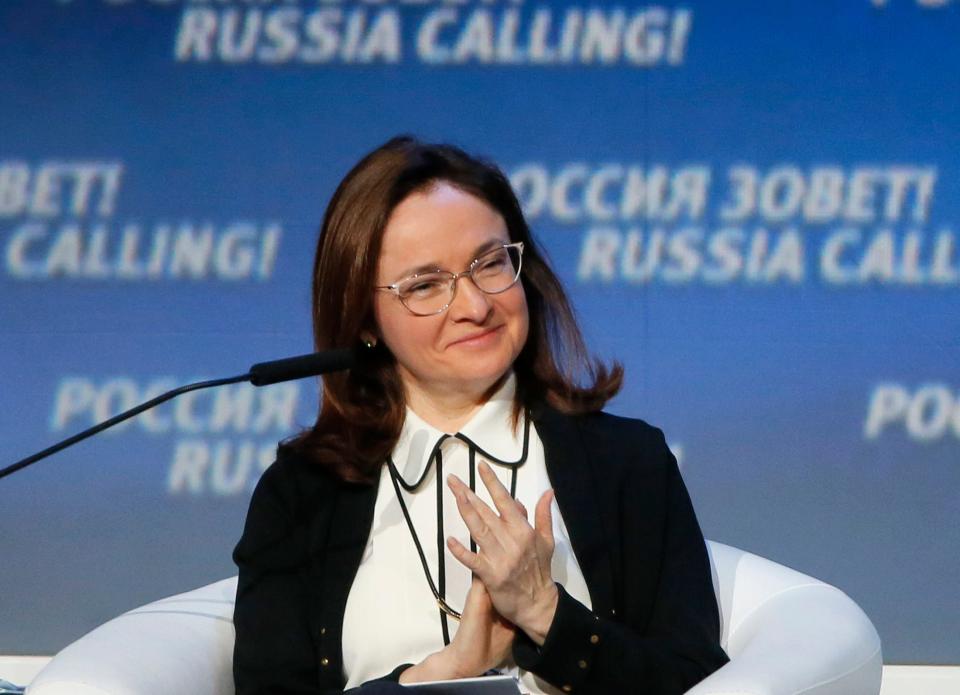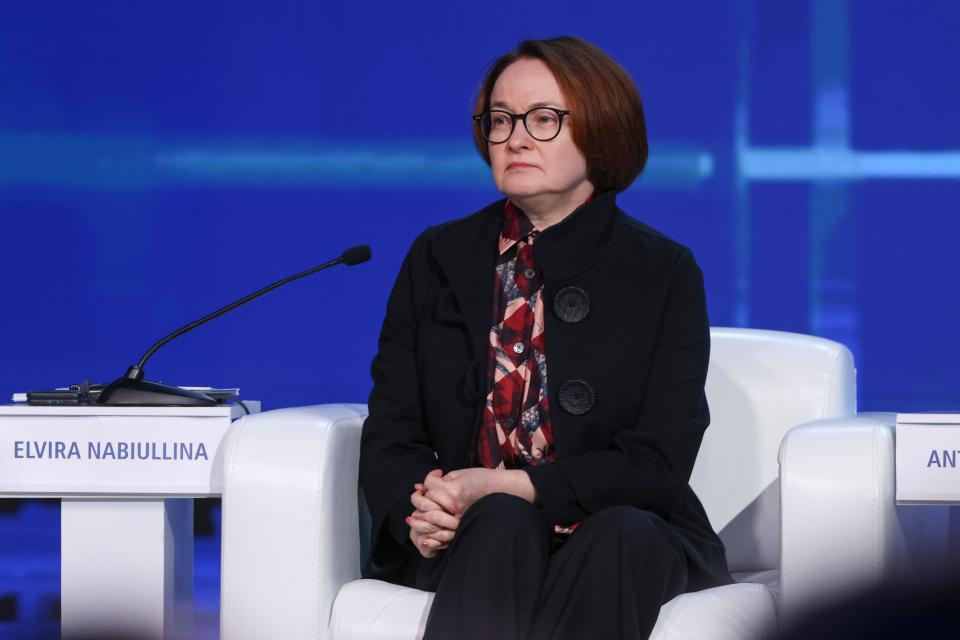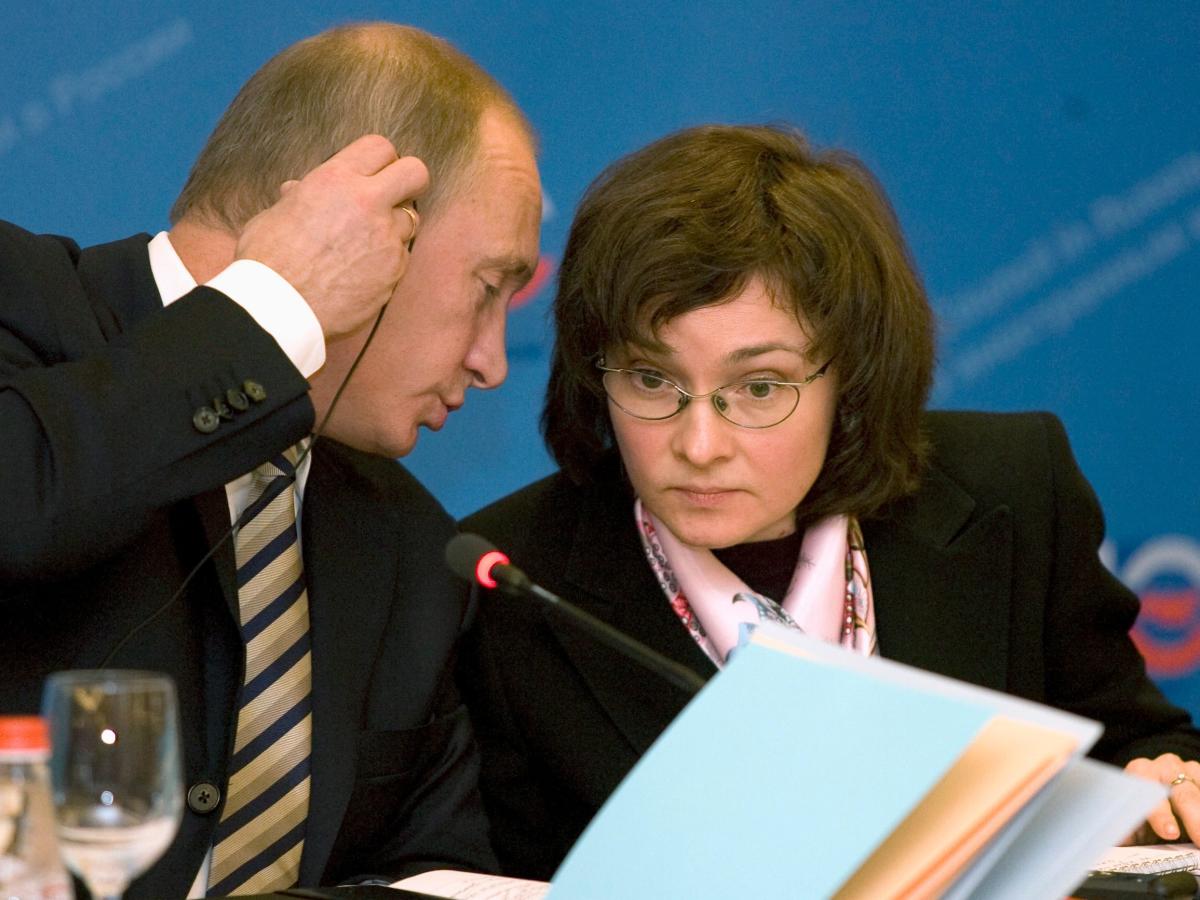- Russian central bank governor Elvira Nabiullina has played a key role in stabilizing Russia’s sanctions-hit economy.
- She has been Russia’s top central banker since 2013 and was once feted internationally.
-
But she is now seen as a complicit participant in Russia’s war against Ukraine.
Russia’s economy was supposed to implode and collapse after the West slapped it with sanctions over its invasion of Ukraine.
But it didn’t.
Russia’s ongoing economic resilience has vexed Western nations, but their reaction isn’t geared only toward Russian President Putin, a former KGB spy with imperial ambitions. It’s also aimed at the woman behind him: Elvira Nabiullina, the country’s central bank governor, who plays a chief role in keeping Russia’s wartime economy ticking.
“Nabiullina has been very effective at stabilizing the Russian economy, despite the enormous economic pressure from sanctions,” Daniel McDowell, a professor at Syracuse University who specializes in the international political economy, told Business Insider. In particular, he credits her use of capital controls and monetary policy to stabilize the ruble and her move to steer Russia away from the use of Western currencies in international trade.
“While the standard of living in Russia has declined under sanctions, conditions would likely be much worse were it not for her shrewd decisions,” McDowell added. “I think it is fair to say that she is writing the playbook for how to respond to external sanctions pressure.”
While many, like McDowell, have credited Nabiullina for her role in propping up Russia’s economy, her role in supporting Putin’s regime is viewed as a betrayal by many Western finance officials, economists, and analysts.
Nabiullina and the Russian central bank did not respond to requests for comment from BI.
Nabiullina wined and dined with Europe’s elite before the war
Just a few years ago, Nabiullina was viewed as a liberal, even among Kremlin insiders. The elite in Brussels appeared to view Nabiullina as one of their own. In 2018, Christine Lagarde, then the director of the International Monetary Fund, praised Nabiullina — a fellow opera lover — as a policymaker who “can make central banking ‘sing.'”
Today, the 60-year-old Nabiullina is as much a pariah in the Western world as Putin is. She has been sanctioned by the US and the UK.
Many of the economists and analysts who once rubbed shoulders with her are turning their backs on the woman who is keeping Russia’s economy alive — thus helping Putin secure his fifth term in the country’s top job.
“She’s very smart, and so are the people around her,” Richard Portes, an economics professor at London Business School, told BI.
However, Portes — who has sat on panels alongside Nabiullina at international conferences — was “very disappointed” in Nabiullina for supporting Putin’s regime.
“I liked her, personally,” Portes added — and he’s clearly not the only one.
As Anders Åslund, a Swedish economist who specializes in the Russian economy, wrote in the Moscow Times in March 2022, “I have never heard her raise her voice. It is difficult to dislike her.”
“The liberals feared that she would be too soft,” Åslund added at the time, referring to her appointment as Russia’s top central banker.
This is just one indication of her unlikely rise to the top echelons of the Russian government.
Daughter of blue-collar minorities
A native of the industrial city of Ufa in Central Russia, Nabiullina was born into a family of ethnic Tatars — a minority group in Russia. Her father was a driver and her mother was a factory worker.
Growing up in the 1970s, she studied French, enjoyed classical music, and read classics by the likes of Leo Tolstoy, Fyodor Dostoevsky, and Franz Kafka, her husband Yaroslav Kuzminov said in 2013, Bloomberg reported.
Nabiullina met Kuzminov — the founder of the Higher School of Economics, a prestigious institution — in the 1980s when he was teaching at the Moscow State University, where she studied economics. They have one adult son.

From supporting character to Putin’s aide
It was at Moscow State University that Nabiullina encountered Western economic concepts, which would prove useful to her in the changing post-Soviet economy.
In 1991, she worked as an economist at the USSR Scientific and Industrial Union Board, according to her official biography. In 1994, she joined the Russian economy ministry’s reforms department.
She left public service in 1998 and rejoined the government in 2000 as a first deputy to Herman Gref — the current CEO of Russian banking giant Sberbank, who is also known as a liberal — who was then Russia’s economy minister. In 2003, she left the position for a think tank, but was invited by Putin to replace Gref as the economy minister in 2007 — which surprised her, Bloomberg reported in 2013, citing her colleagues.
The invitation marked a turning point in her career. After all, she was also used to playing a supporting role.


Her move into a leading role was solidified in 2013 when Putin installed her as central bank chief.
“I want to thank you for the trust you’re placing in me with this nomination, understanding how responsible, difficult, and professional this work is,” Nabiullina said of the nomination.
She declined to comment to Reuters about her appointment at the time.
Like many central bank bosses around the world, Nabiullina is better known in financial circles than among the general populace. She also appears to stay out of the limelight unless she’s talking about her work.
International central-banking star
Putin’s appointment of Nabiullina to the role of top central banker in 2013 propelled her into international stardom. At the time, she was the first woman to lead a Group of Eight, or G8, central bank.
Nabiullina proved her worth to Putin a year into the job in 2014, when Moscow annexed Crimea and Nabiullina insulated the Russian economy from Western sanctions.
Despite differences over the annexation — which prompted the US and other powers to kick Russia out of the G8, which has now become the G7 — Nabiullina still gained international respect and recognition among her professional peers in the years after for integrating Russia’s economy into the global system and modernizing the country’s central bank.
In 2015, Euromoney, a finance trade publication, named Nabiullina Central Bank Governor of the Year. In 2017, The Banker named her Central Banker of the Year for Europe. In 2018, the IMF invited her to deliver its prestigious Michel Camdessus lecture.
She has been described as effective, a pragmatic professional, and non-ideological.
Critics, however, argue she’s just another Putin crony. There are also those — like Åslund, the Swedish economist — who say her track record as a central banker isn’t that great.
“Her reputation for competence is very high,” said Portes. “Her reputation for defending a free society is very low. Her reputation for not opposing an unprincipled, foolish, disastrous war is very low.”
Putin’s top technocrat
After Russia launched the war in Ukraine, Nabiullina was rattled enough to want to quit her job, Bloomberg reported on March 23, 2022, citing four unnamed people with knowledge of the discussions.
Putin rejected her resignation and Nabiullina stayed for a fresh five-year term. She appears to be highly effective at it thus far.
Russia’s GDP grew 3.6% in 2023. The International Monetary Fund expects its economy to grow 2.6% this year. Unemployment is around a record low, and wages are soaring.
To be sure, not all is well in the Russian economy. Wartime expenses — such as military spending and government subsidies — have driven much of Russia’s growth in the last two years. The country is also experiencing a labor shortage due to military conscription and a brain drain.
But Nabiullina has thus far also managed to pull various levers, such as those for interest rates and currency controls, in the economy’s favor.
For many, she is now a complicit participant in Putin’s war who is using hardline tactics to keep the economy humming.
“Being on Putin’s team means that you share his values, you share his principles, and you are enormously loyal to him,” Sergei Aleksashenko, a former top Russian central banker, told the Financial Times in December 2022.
It’s clear Putin trusts Nabiullina. Government officials have gone head-to-head with her over her policies, but the Russian leader has stuck with her and backed her publicly even before the war started.
It helps that Nabiullina doesn’t have political ambitions, thus posing no direct threat to Putin’s reign, and is hardcore about keeping inflation down, Alexei Makarkin, an analyst with the Moscow think tank Center for Political Technologies, told The Wall Street Journal in April 2022.
Nabiullina and the war in Ukraine
As for Nabiullina, a technocrat working at the highest echelons of one of the most opaque regimes in the world, it’s hard to know what she thinks about her role in propping up Putin’s regime.
She’s known to convey her thoughts through her brooches and apparel, so some analysts read into her “funereal black” dress code days after the war as a signal of sadness and personal resistance to the conflict.


In December, Russia’s RBC business daily asked her what she thought of being named the world’s top “Disruptor” of 2023 by Politico Europe for her role in steadying Russia’s sanctions-hit economy. Nabiulina held back on expressing an opinion, saying it was hard to comment on the question.
She has on occassion been more candid than most Russian officials about the state of the country’s sanctions-hit economy. In April 2022, Nabiullina said Russia’s reserves can’t last forever. In December, she issued a warning that Russia’s economy was at risk of overheating.
In a leaked video disseminated days after Russia invaded Ukraine, Nabiullina called on her central bank staff to set politics aside and focus on saving the sanctions-hit economy, according to the Journal.
“I know it’s not easy, but really, let’s not get into political arguments at work, at home, on social media,” the top central banker said in the video. “They only burn out the strength we need to do our job.”
Despite the ongoing war, the economy she helped engineer now appears to have some semblance of normality for ordinary Russians. Nabiullina is going to the opera again.
But if Nabiullina had sympathizers in the early days of the war about how she’s caught in a Catch-22 since saving the Russian economy means helping Putin, she now has few of them left.
“She knows better, but there it is. She decided right at the beginning that she would work with Putin and support the policies,” said Portes, the economics professor.
“That she would collaborate with Putin’s regime the way it has gone, that’s sad,” he added.
Read the original article on Business Insider
